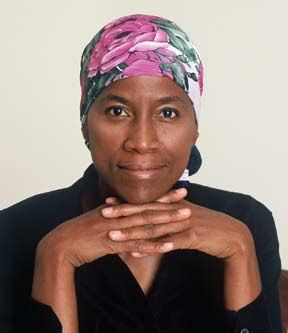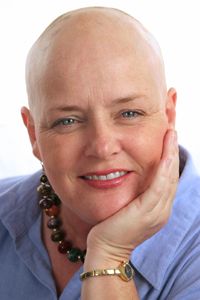One side effect of many types of chemotherapy is hair loss. For women who begin breast cancer treatment with neoadjuvant chemotherapy, losing hair is probably the first visible sign that they are going through a significant medical trauma. For many people receiving chemotherapy, wearing a hat or scarf in public is a recognizable advertisement that they have cancer. It may not be the first thing someone wishes to communicate about herself.
Losing one's hair is not an insignificant loss. Hair helps define a face and is usually styled to fit a personality. We recognize people by the color, length, and shape of their hair, and it is one of the first things we comment on when it changes. Even women who've never been fond of their hair may not be anxious to see it go. However, it is not an irreplaceable loss. Unlike a breast, it will grow back. It may take a long time, and it may not be the same as it was, but women do not stay bald forever.
There are so many things to pay attention to when faced with cancer and chemotherapy that many women may not take the time to look at the bright side of losing their hair. In an attempt to help ease this transition and make light of this inevitable change, below is a list of advantages of not having hair. Perhaps you'll be able to add to this list.

Credit: Courtesy of womenshealth.gov and cancer.gov. Used with permission.
Significant Benefits
You may be surprised at how much more time you have in the day. Showers are much shorter when you don't shave your legs or wash your hair. Getting ready for work does not involve blow drying, curling, and/or styling your hair. Grab the wig or a hat (or not) and head out the door.
You can save a lot of money by not having to deal with hair for several months. It isn't just the expense of a haircut, perm, or coloring you save, but also shampoo and conditioner, electricity that powered the blow dryer, flat iron, or curler, and the hot water you didn't use in the shorter shower.
If hair helps define us, you have an amazing opportunity to redefine yourself to the world! You can buy several wigs (though insurance may only pay for the first one) to express different parts of your personality. You can wear a scarf to match your mood. You can increase your options and experiment.
Quirky Things to Look Forward to
- When the wind blows, you won't have hair in your face.
- When you cook supper, you won't leave hair in the food.
- Cleaning the house is easier: no hair in the shower drain, no hair on the dresser, no hair in the dust bunnies under the bed.
- When you travel you don't have to carry along your conditioner, styling gel, blow dryer, flat iron, or curler.
- Your earrings are more noticeable.
- You can cuddle with someone and not get hair in their face.
- When you get a hot flash, just take off your wig or hat and cool down quickly.
- You can look forward to the possibility that your hair will be different when it grows back.
- You can empathize with bald men.
- You can make bald men jealous when yours grows back.
- You can see what your skull looks like.
- If you lose your eyebrows, you can draw them any way you like.
- You won't have to pull out those errant hairs that normally grow in places they shouldn't.
- If you are caught in a gentle rain with the wig, you won't get a wet head.
- Wearing a swim suit will never be easier.
- You'll never have a bad hair day!

Credit: Courtesy of womenshealth.gov and cancer.gov. Used with permission.
Tips for What to Expect
Many women can share advice about what to do when your hair starts to come out. It doesn't fall out all at once, but in patches and clumps. You'll notice it on your hands when you wash your hair, in your brush, and on your pillowslip. It may take a week, and you may not have realized you had that much hair to lose! Some women prefer to skip over this phase and ask a barber to shave their head. Leaving all your hair under their chair is much easier and less traumatic than cleaning it up from your house.
Hair on the rest of your body may or may not fall out. Some women lose every single hair, everywhere. Others lose only the thicker hairs. Some hair sticks around longer, only to fall out during a later chemotherapy cycle. Eyebrows and eyelashes may or may not disappear.
The local office of the American Cancer Society has wigs, hats, and scarves for you to use. Women often donate their used headgear when their hair returns.
When your hair begins to grow back, it often has a goofy kink in it, as if the hair follicle is out of practice. You can trim these kinks off and wait for twisted eyelashes to fall out on their own. The first hair back tends to be soft and downy, like the hair on a newborn. It may take a month or two to get out of the "baby bird" stage.
Summary
Although losing your hair can be upsetting, with a positive attitude you may find that it is freeing to not have hair for this small portion of your life. You can have fun rubbing a washcloth over your head in the shower and calling it clean. It also can be a joy to watch your hair grow back. In the grand scheme of things, it may not be important to spend much time thinking about hair unless, of course, you are adding to the list of advantages of becoming hairless.
Acknowledgments
M. C. Monroe is a professor in the UF/IFAS School of Forest Resources and Conservation. B. F. Shea is an oncologist at Wentworth-Douglass Hospital in Dover, NH. Reviewed by M. J. Markham, College of Medicine and L. B. Bobroff, UF/IFAS.